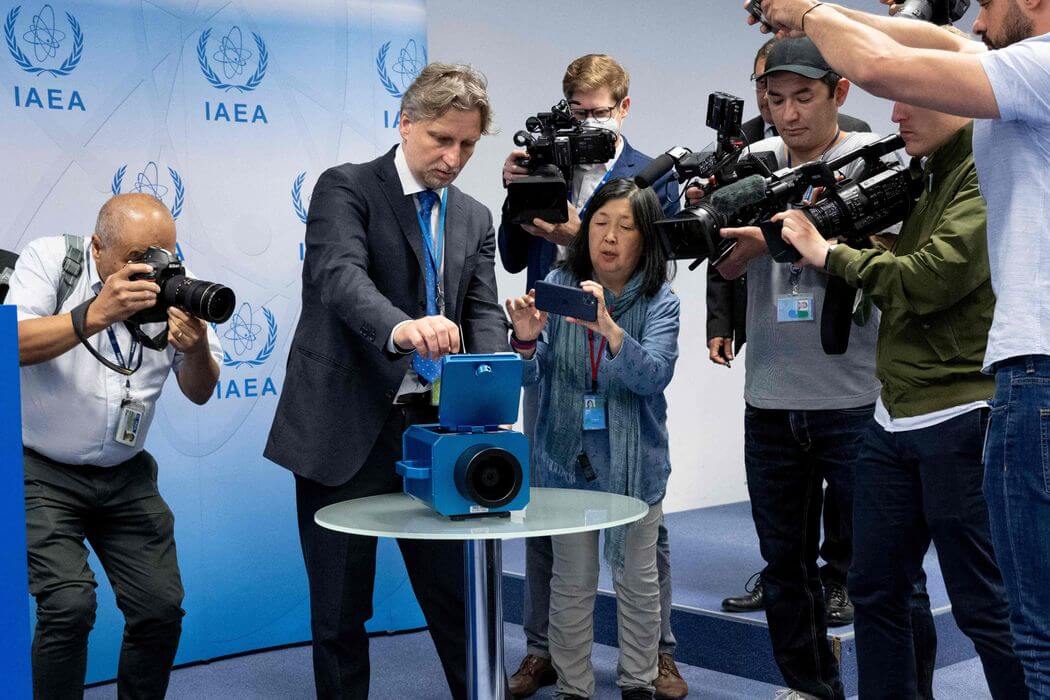Iran on Thursday dismantled 27 International Atomic Energy Agency (IAEA) cameras in nuclear facilities across the country in retaliation to the nuclear watchdog passing a resolution chastising the country for concealing its nuclear activities. Additionally, it announced a series of steps aimed at further accelerating its nuclear programme and even threatened to stop cooperating with the agency entirely.
IAEA Director-General Rafael Grossi said during a press conference on Thursday that Iran had informed the agency of the removal of cameras and other surveillance equipment. He said that such a move would be a “fatal blow” to attempts to revive the 2015 nuclear deal, officially known as the Joint Comprehensive Plan of Action (JCPOA).
Furthermore, the IAEA chief said Iran’s window of opportunity to restore cooperation with the IAEA is very small. However, he noted that there are still roughly four weeks during which Iran could return to compliance before matters get out of hand.
The footage of the moment when #Iran’s atomic organization switched off @IAEAOrg cameras at a nuclear facility ahead of passing a resolution on Iran at the IAEA BoG. The cameras were disconnected by cutting off electricity & AEOI spokesman is being heard explaining the process. https://t.co/lxtLPYnORJ pic.twitter.com/zaXEhHOGST
— Abas Aslani (@AbasAslani) June 9, 2022
He called the current situation one of “uncertainty” and “less transparency” and said that he “deplores” Tehran’s posture, as it has resulted in a “tense situation” on the issue of reviving the JCPOA. In this regard, he urged Iran to tone down its emotions and focus on problem solving. By “not solving anything, we are aggravating everything,” he added.
Grossi also separately told the agency that Iran plans to accelerate its nuclear programme by installing two IR-6 advanced centrifuges at the Natanz facility that will enhance its ability to rapidly enrich uranium. An IR-6 centrifuge spins uranium ten times faster than other centrifuges. The move could allow Iran to quickly add to its stockpile of enriched uranium, which the IAEA says is sufficient to produce a nuclear weapon.
Iran’s latest moves came in response to an IAEA resolution on Wednesday that censured it for failing to inform the agency of uranium traces found at three sites. The report, drafted by the United States (US), the United Kingdom, France, and Germany, was the first time since 2020 that the agency formally condemned Iran.
IAEA passes Iran safeguards resolution.
— Ali Vaez (@AliVaez) June 8, 2022
In favour: 🇦🇷🇦🇺🇦🇹🇧🇷🇧🇮🇨🇦🇨🇴🇨🇿🇪🇬🇫🇮🇫🇷🇩🇪🇬🇹🇮🇪🇯🇵🇰🇷🇲🇾🇲🇽🇳🇿🇵🇪🇵🇱🇸🇳🇸🇮🇿🇦🇪🇸🇨🇭🇦🇪🇬🇧🇺🇸🇻🇳
Against: 🇷🇺🇨🇳
Abstain: 🇮🇳🇱🇾🇵🇰
Tehran had previously warned that any attempt by the IAEA to blame Iran would be met with severe consequences. President Ebrahim Raisi called the IAEA’s decision a war against Iran launched by the West.
Raisi, who has on numerous occasions asserted that Iran’s nuclear programme was peaceful, said on Thursday that “the enemy does not want this country to achieve and develop” its nuclear industry. “This is a war of wills so far and will continue to be so,” he remarked.
He stressed that Iran is “serious about its right” and issuing resolutions against it will not work. “We will not take a single step back from our positions,” he added.
The government released a statement describing the passage of the resolution as a “political, incorrect, and unconstructive action,” reiterating that Iran has acted in “good faith” by providing the IAEA with “accurate technical information.” It went on to claim that Iran hass “one of the most transparent nuclear programmes” and thus said the resolution was based on a “hasty and unbalanced” report by Grossi as well as the “Zionist regime’s false and fabricated information,” referring to Israel.
In his first comments on the IAEA resolution, President Raisi says Iran "will not retreat a single step from its positions".
— Kian Sharifi (@KianSharifi) June 9, 2022
He questions the efficacy of international resolutions, whether on Iran or the Israeli-Palestinian conflict, and says Palestinians will triumph. pic.twitter.com/R53x5DE2C1
Moreover, Atomic Energy Organization of Iran (AEOI) spokesman Behrouz Kamalvandi said that Tehran is considering taking additional retaliatory measures. He said that Iran has no plans to cooperate with the IAEA because the agency ignored Tehran’s goodwill gestures.
“We expect them to come to their senses, and reciprocate Iran’s cooperation. It is not acceptable for Iran to continue cooperation, whilst the other side does not show proper behaviour,” Kamalvandi said.
The overwhelming majority of the @IAEAorg Board of Governors made clear to Iran that it must provide the IAEA credible cooperation and resolve concerns. At the same time, Iran should use this opportunity to return to full implementation of the #JCPOA.
— Secretary Antony Blinken (@SecBlinken) June 9, 2022
Meanwhile, the US condemned Iran’s moves. Stating that the IAEA resolution was necessary to prevent Iran from ramping up uranium production, Secretary of State Antony Blinken said that Tehran’s moves to “threaten further nuclear provocations and further reductions of transparency” are “counterproductive and would further complicate our efforts to return to full implementation of the JCPOA.”
“The only outcome of such a path will be a deepening nuclear crisis and further economic and political isolation for Iran. We continue to press Iran to choose diplomacy and de-escalation instead,” Blinken stressed.
Iran, however, has claimed that it has no desire to develop nuclear weapons, with Foreign Minister Hossein Amir-Abdollahian saying on Thursday: “The United States and the West know that the atomic bomb has no place in Iran’s Islamic beliefs.”

